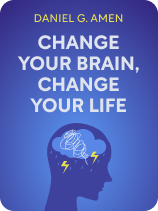

This article is an excerpt from the Shortform book guide to "Change Your Brain, Change Your Life" by Daniel G. Amen. Shortform has the world's best summaries and analyses of books you should be reading.
Like this article? Sign up for a free trial here.
Do you feel more guilty than you probably should? Do you have trouble sleeping? Is it hard for you to concentrate?
If you answered “Yes” to any of these questions, you might suffer from limbic system dysfunction. In his book Change Your Brain, Change Your Life, psychiatrist and brain health expert Daniel G. Amen lays out the common symptoms and provides several recommendations to restore your system to health.
Continue reading to learn about symptoms of—and repairs for—limbic system dysfunction.
Symptoms of Limbic System Dysfunction
If you find yourself overwhelmed with persistent sadness, perceiving the world through a bleak and colorless lens, you may be experiencing limbic system dysfunction. These symptoms align with the telltale characteristics that Amen describes, including the following:
- Emotional distress: feelings of sadness, excessive guilt, or crying spells
- Lack of vitality and interest: low energy levels, appetite and sleep problems, fluctuations in sexual responsiveness, and a tendency toward social isolation
- Negative self-perception: low self-confidence and heightened sensitivity to criticism
- Cognitive struggles: memory lapses and issues with concentration
- Sensory sensitivity: heightened adverse response to odors
| Other Possible Causes of These Symptoms While these symptoms can arise from damage to the limbic system, health experts propose a wide range of other potential causes. The following list underscores the complex nature of emotional responses and memories, suggesting that Amen’s approach of linking specific brain regions to particular symptoms may result in inaccurate diagnoses. Emotional distress may result from mental health challenges such as depression or burnout. Lack of vitality and interest is often associated with hormonal imbalances. Negative self-perception can stem from challenging circumstances such as bullying, abuse, or social pressure. Sensory sensitivity can arise from pregnancy or conditions such as migraines, allergies, nutritional deficiencies, or specific neurological conditions. |
Repair and Optimize Your Limbic System
Amen’s suggestions for repairing and optimizing your limbic system region include the following treatments.
Aromatherapy: Diffusing pleasing fragrances to relieve stress and promote emotional well-being calms the limbic system.
(Shortform note: Research supports this method. Studies measuring the impact of different scents on alpha and beta brain waves found that inhaling essential oils such as lavender, rosemary, rose, eucalyptus, jasmine, geranium, chamomile, clary sage, thyme, and peppermint lowered blood pressure, induced relaxation, and enhanced brain stability.)
Acupuncture: Inserting fine needles into specific points on the body can increase blood flow to the brain and help regulate your mood, thus contributing to limbic system balance.
(Shortform note: Research implies that acupuncture stimulation may have different outcomes on the brains of different sexes due to sex dimorphism (the biological and physiological differences between sexes of the same species beyond sexual organs). According to this research, in response to acupuncture, men showed more activity in brain areas related to physical sensation, whereas women experienced reduced activity in regions associated with emotion and cognition. These findings suggest that acupuncture might be more effective for addressing physical symptoms in men and managing stress and emotional well-being in women.)
Repetitive transcranial magnetic stimulation (rTMS): Administering magnetic pulses to stimulate and optimize brain activity patterns, including those in the limbic system, can improve emotional stability.
(Shortform note: To undergo this treatment, you’ll need to attend daily sessions at a clinic for four to six weeks. During these sessions, an electromagnetic coil is placed against your scalp. The coil is designed to emit magnetic pulses that stimulate nerve cells in brain regions associated with mood control and depression. While rTMS is generally safe and non-invasive, you might experience side effects such as scalp discomfort, headache, facial muscle twitching, and lightheadedness. Though rare, more serious side effects like seizures, mania, or hearing loss may also occur.)
Cranial electric stimulation (CES): Applying low electrical currents to enhance mood and improve emotional regulation can potentially influence limbic system functioning.
(Shortform note: This noninvasive, FDA-approved treatment for insomnia, depression, and anxiety involves actively applying a low-intensity current to the earlobes or scalp. While the exact mechanisms of CES aren’t yet fully understood, research suggests that the electrical current alters brain activity, deactivating certain areas of the cortex and altering connections within the default mode network.)
Neurofeedback: Using real-time monitoring of brain-wave activity to help control the brain’s electrical patterns and optimize emotional balance can potentially benefit the limbic system.
(Shortform note: To grasp how neurofeedback works, you first need to know that different mental states align with specific brain frequencies—alpha, beta, delta, theta, and gamma. Neurofeedback tracks brainwave activity and presents these frequencies in visual or auditory forms. This means you can see changes to your brain frequencies as they occur, and therefore understand what stimuli trigger certain changes. With this knowledge, you can improve your ability to self-regulate your mental state by consciously navigating triggers and controlling frequency changes.)

———End of Preview———
Like what you just read? Read the rest of the world's best book summary and analysis of Daniel G. Amen's "Change Your Brain, Change Your Life" at Shortform.
Here's what you'll find in our full Change Your Brain, Change Your Life summary:
- A more effective approach to overcoming physical, mental, and cognitive issues
- The four factors to nurture to improve your brain health
- Why listening to Mozart can enhance your focus and mood control






